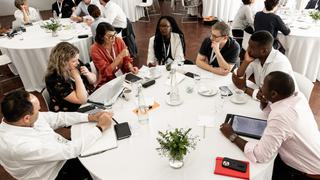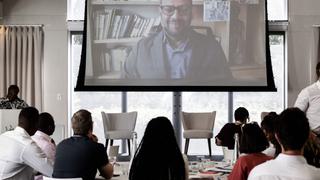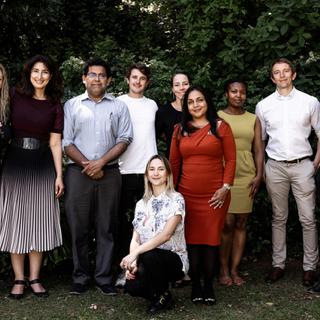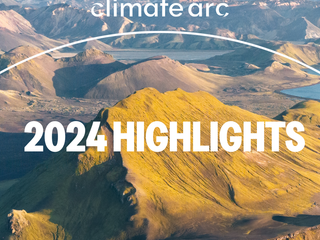South Africa faces a substantial funding gap for its National Determined Contributions (NDCs), estimated between ZAR 1.0 trillion and ZAR 2.4 trillion up to 2030 (Intellidex 2022). Yet only ZAR 431 billion was invested in climate finance from 2017 to 2021.
That gap set the scene for a workshop we convened in partnership with the African Climate Foundation (ACF) and with support from the National Business Initiative (NBI). Alongside financial decision makers, think tanks, NGOs and data organizations, we explored the challenges and opportunities that the country’s finance sector is facing in the global race to net zero.
What came through loud and clear in the discussions was South Africa’s potential to regain its status as the leading investment destination in Africa, particularly in the context of climate-related initiatives. Historically regarded as the financial hub of the continent, South Africa's opportunity lies in putting innovative climate instruments in place and establishing a robust architectural framework. By doing so, the country can position itself as an attractive place for investment, drawing attention and capital back to the region – playing a leadership role in Africa and globally in achieving net-zero goals.
Whilst the context in South Africa is nuanced and unique, many of the underpinning challenges are ubiquitous to financial decision-making. Here are eight ways our workshop participants concluded that we could accelerate positive progress…

1. Close data and analysis gaps
Financial decision makers need credible transition plans and analysis that can be relied upon. Lack of data makes it hard for banks to commit due to ‘transition realization fear’ – as once a net-zero target is in place, it will need to be met.
Only through improvements in data quality, better understanding of sectoral transition in a developing country context, and engagement, can financial institutions (FIs) trust in their client’s transition plans and make that commitment.
2. Consolidate and improve sectoral pathways
Pathways link the science of the remaining carbon budget to specific sectoral steps for reducing greenhouse gas emissions within defined timeframes. They are essential for FIs to align their activities with the net-zero transition.
Good pathways should provide benchmarks for the pace of emissions reduction, set clear targets for sectors and identify interdependencies, and outline actionable strategies. And, importantly, they need to be aligned to developing country contexts when being deployed in the Global South.
Understanding and incorporating the need to ensure a just transition to net zero by 2050 in developing countries is essential to the development of helpful tools and benchmarking frameworks used to inform investment decisions.
3. Unlock the potential of green taxonomies
Green taxonomies provide clarity on investments and serve as a safeguard against greenwashing practices. But they’re only valuable when actively used, and FIs are finding them challenging due to their complexity. This can result in ‘greenhushing’ (staying quiet about climate and sustainability initiatives to avoid scrutiny).
Establishing a baseline for labels and tags as well as clarity of use, particularly around the grey areas that are sensitive to developing countries and just transition contexts, is crucial to providing a common framework.
4. Support to navigate the climate disclosure landscape
FIs are feeling overwhelmed when disclosing the performance of their climate activities, as there are so many different, and often overlapping, frameworks that they need to report on. The absence of clear guidelines and uniform practices in using these frameworks creates a level of uncertainty and can sometimes slow down action.
Comprehensive and standardized guidelines can help to address some of these challenges, but this needs to be accompanied by robust guidance around practical implementation.
5. Build human capacity
Financial decision makers face challenges in accurately assessing climate-related risks and transitioning investments to be just-transition- and net-zero-aligned. This requires skills – the ability to use frameworks, market understanding, due diligence, and align risk perceptions with tangible outcomes.
Understanding adaptation financing as well as mitigation is also critical. Decision makers need specific sector knowledge to expand products and tap into adaptation opportunities. And financing newer climate technologies, such as green hydrogen, demands a deeper understanding of, and commitment to, sectoral pathways for confident capital allocation.
Sharing successful case studies is one way that we can develop these skills and encourage nuanced perspectives.
6. Effective policy and regulation
To drive more investments and financing towards environmental initiatives, governments can implement carbon taxes on corporations. The blanket carbon tax in South Africa is too low currently. What is needed is a more nuanced carbon tax at sectoral level, tailored to decarbonization transition pathways. This debate is currently underway between industry and the Treasury. Similarly, positive incentives such as tax breaks can be used to accelerate climate solutions.
7. Develop scalable de-risking mechanisms and green instruments for investors
Fossil fuels have generated consistent and stable returns for FIs in South Africa. But the continued focus of domestic capital on oil and gas is hindering the flow of international capital. To build confidence, it is critical for FIs to understand the size of the market and potential earnings.
Counterparty risk (the likelihood that one party will default) and the absence of a secondary market hinder asset flow to investments. De-risking instruments are vital to bridge this gap effectively. Collaboration among banks can efficiently address common challenges without compromising competitiveness. There is also a role to play here for blended finance that incorporates finance from other sources – such as philanthropic capital – to support de-risking. The increased cost of capital in climate transition makes investments appear experimental, necessitating a feedback loop to foster trust and understanding.
8. Overcome financing challenges: scaling for investment
Other challenges in financing climate-related projects (e.g. some smaller agriculture projects) lies in the readiness and scale of those projects. While there is, overall, a limited pipeline of investment-ready projects, some green projects do exist. Unfortunately, some may be too small and lack the individual financial appeal to attract investment. The key is to coordinate and aggregate these projects to create a more substantial project pool, increasing the appeal to investors and enabling financing to be structured more effectively.

Where do we go from here?
One of Arc’s strategic pillars is to support the transition data and knowledge ecosystem which is critical for South Africa to capitalize on climate financing. An enabling environment for this ecosystem is crucial to ensure success.
Arc is ready to support South Africa with best practice examples and case studies from our fast-developing network of climate finance Hubs across emerging markets.
We are closely monitoring the following elements that are required to accelerate transition efforts in South Africa:
- Good governance: establishment of further enabling and regulatory frameworks.
- Knowing where we need to go: the development of granular sectoral pathways to support FIs in decision-making. It is critical that these are done by the appropriate and mandated entity and that the supporting benchmarking and assessment tools are aligned to the developing country context and to what would support the just transition to net zero by 2050.
- De-risking the transition: increased financial, and other, support to mitigate project risks, decrease the cost of capital, and to ensure sustainable implementation of projects that have commercial and tangible positive social development outcomes.

Dig deeper into the research
To inform the Conversation Tour in South Africa, we commissioned Genesis Analytics to conduct an overview of challenges and opportunities of climate finance.
The Presidential Climate Commission has also recently collaborated with GreenCape and CPI to release a report which analyzes climate finance flows covering the years 2019-2021.
Interested in our transition work?
We are keen to remain engaged to explore further collaboration as the local transition ecosystem develops. If want to stay connected, please get in touch.




